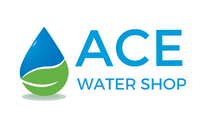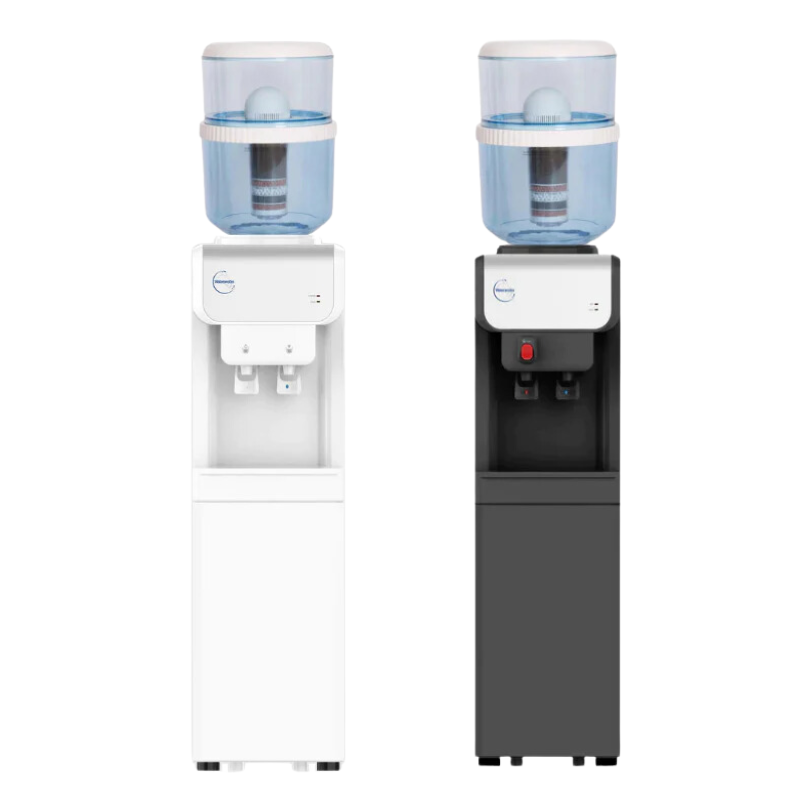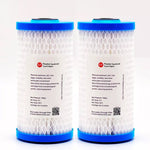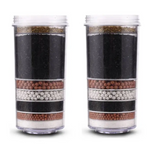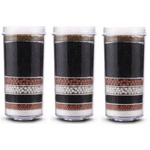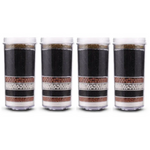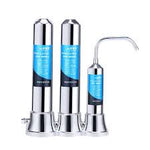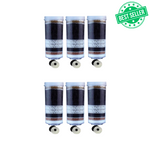You have no items in your shopping cart.
Water infusion has been a hot topic in the health and wellness business for a long time, with various infusion and filter water bottles available. In recent years, more people have begun filtering and enriching their water with activated charcoal. So why is charcoal good for filtering water?
CHARCOAL USED AS WATER FILTER
Activated charcoal offers a long list of health benefits, not to be confused with the thing you put on your grill. It's also one of the few effective ways to get rid of contaminants like chlorine, typically found in tap water.
Activated charcoal comes from a substance that has been burned without oxygen to produce char, commonly wood, coal, coconut shell, or bamboo. After that, the material is heated to a high temperature and exposed to various gases. It becomes incredibly porous due to the multi-step process, which we mean when we say 'activated.'
The increased surface area of activated charcoal allows it to bind to any material. It works like a strong magnet, attracting and adsorbing any hazardous compounds it comes into touch with. Don't confuse it for absorption. The process of Adsorption occurs when molecules are pulled to the adsorbent's surface instead of absorbed into it. Activated charcoal has no odor, taste, or toxicity.
WHY IS CHARCOAL GOOD FOR FILTERING WATER?
It doesn't get rid of the "good stuff."
Drinking water contains more than just hydrogen and oxygen. It also includes a variety of other minerals, as well as harmful compounds and contaminants. Most water filters effectively remove these contaminants, whether chemically or mechanically. But they frequently eliminate many of the essential minerals and ions that are beneficial to human health.
These filters attract and absorb hazardous organic molecules while leaving the remainder of the minerals in the water due to activated charcoal's chemical structure and composition. Because it doesn't eliminate all pathogens or germs, some frequently use charcoal with another filter.
It enhances the taste of the water.
Many people seem to hate the taste of tap water, claiming that it is metallic in flavor or has an unpleasant odor. The compounds added to tap water to remove bacteria and diseases in reservoirs, such as chlorine, often blame this flavor. Even though it's an important practice to maintain good public health, it frequently results in individuals avoiding drinking tap water. It exposes them to the danger of dehydration or purchasing plastic bottled water, which is harmful to the environment.
Charcoal filters not only adsorb these foul-tasting compounds but also effectively remove smells, making your drinking water much more pleasant to drink.
It improves the quality of water.
Charcoal filters may not only remove a lot of the bad stuff from your water, but they can also add things back in to make it healthier. Activated charcoal can improve your water quality by reintroducing key minerals like calcium, magnesium, and iron.
Simple to keep up with.
After spending a budget-friendly sum on the filter, you may pay less time maintaining it. After all, you don't need to check or repair it regularly. To keep this product in good working order, replace the filter element.
A fresh filter may have a lengthy lifespan. Check to see if it’s still working after four months of use. Because of the following variables, it may extend the time frame.
If your house consumes a huge amount of water, you may find yourself going through many filters in a short amount of time. Observe if the water seems to have a strange color or flavor. However, you must replace the unit.
You may have to replace the filter if you notice a reduction in water flow. It’s especially important when there's any debris in the unit. Because the filter elements are affordable, you can immediately replace them.
It is inexpensive.
Many water purification systems can be costly, yet they are a requirement for your home. On the other hand, Charcoal filters are inexpensive to manufacture, and the savings pass on to the consumer.
They are simple to keep clean.
Although you must replace the filters after using the charcoal, they're inexpensive and simple to find and install.
Approximately every six months, you should update your charcoal water filter. However, it's dependent on how much water you consume and the quality of the water in your area. If you're not sure, check the quality of your water and see if the taste has changed or the flow rate has slowed. It may be time to switch your filter if you observe any of these things.
It improves the health of your teeth and gums.
Harmful materials and poor oral hygiene can cause teeth discoloration. Fluoride in tap water, for example, can alter the appearance of any tooth.
Activated charcoal can help with a variety of dental conditions, giving you a beautiful smile. It, for example, removes any particles that could injure your teeth. Then, using its features, it cleans the teeth and eliminates bad odors.
No need for an external power source.
If you want to use this model, you don't need to plug it in; instead, the activated carbon and water pressure fuel the filter. One of the most significant benefits of charcoal filtration systems is that they cost less on utility bills.
Can withstand the effects of aging and alcohol poisoning.
Do you wish to appear younger than you are? Then you should utilize active charcoal, which helps to keep essential body organs healthy. This functionality affects your cellular age and overall health.
The activated charcoal in the water minimizes the number of hazardous chemicals. Your organs will be able to battle fewer pollutants while your cells will survive longer due to this reduction.
You can also use active charcoal to lower an intoxicated person's alcohol levels. When someone drinks beer or spirits, the liver has to work extra hard to break down the toxins, burdening the organ. However, you can treat any indicators of alcohol poisoning with a dose of activated charcoal.
It's compatible with a variety of other purification systems.
If your building has a water filtration system, you can add a charcoal filter to it. A reverse osmosis machine, for example, can work with this type of filter.
Water travels through a semipermeable membrane at high pressure in a reverse osmosis water filter system. It catches dissolved particles during this process.
An RO system with a charcoal filter lasts longer since the activated charcoal aids in the removal of contaminants. The charcoal filter protects the RO system from blockages and unnecessary labor by catching large debris. In addition, a combination of the two technologies extracts pollutant traces.
It allows for purification selection.
Impurities in water can harm people in a variety of ways. Water for drinking, for example, takes more attention than water for washing.
You can choose how your charcoal filtration system cleans the water with a charcoal filtration system. Find tailored filters that can address specific concerns to accomplish this.
IS ACTIVATED CARBON EFFECTIVE AT PURIFYING WATER?
Charcoal filters, also called activated carbon filters, contain microscopic carbon particles in blocks or granules. These treated pieces make them extremely porous. A field's surface area (6400 sqm) equals 4 grams of activated carbon, perfect for water filtration. So, you're probably wondering why people favor activated carbon for water filtration.
The charcoal filters absorb pollutants and other chemicals effectively due to their large surface area. When you pour water through a charcoal filter, all of the impurities in it adhere to the charcoal filter. Temperature and water flow are also crucial elements in determining efficacy. Coldwater, for example, should be placed into a tiny charcoal filter at a lower pressure.
When measuring the performance of activated carbon filters, particle size is also an important factor to consider. Granular activated carbon, or GAC, has no set limit because it is porous. However, activated carbon is in block form. It can only filter particles that are 0.5-10 microns in size.
HOW IT WORKS
The tap water you drink contains a variety of contaminants and compounds that can have long-term detrimental effects on your health. As a result, experts strongly suggest activated carbon for water filtration. Hundreds of pollutants and impurities are sucked out of the water by activated carbon.
According to recent NSF and EPA studies, it can remove 60 to 80 pollutants. It can reduce 22 to 30 substances.
The grade and type of activated carbon determine how well it eliminates contaminants and toxins. According to EPA data, Activated carbon technology can filter the 32 identified organic pollutants, including THMs. Activated carbon was unaffected by the most common 12 herbicides and 14 insecticides, including glyphosate.
Moreover, activated carbon or charcoal filters are used in whole-house filters, reverse osmosis (RO), UV filters, and various other filtration technologies.
WHAT DOES IT REMOVE
You'll be familiar with the benefits of employing an activated charcoal filter once you've completed reading it. What remains to be seen is what chemicals and contaminants it will be able to eliminate. Is it effective in filtering out every element that could harm someone's health? Check out some of the pollutants and compounds it eliminates.
Pesticides
Agriculture has been using pesticides to prevent pests from harming crops, as most people are aware. Pesticides are found in freshwater sources such as rivers, ponds, and groundwater. It occasionally works its way to tap water, despite treatment. Ergo, most people cleanse their water with activated carbon. It can remove pesticides, including Lindane, Chlordane, Chlordecone, and others, in approximately 14 different ways.
Chlorine
Chlorine is added to water to make it safe to drink. It may change the taste and smell of the water in ways you don't like. You can remove this compound with an active carbon filter. It can remove up to 95% of the chlorine from your water from the tap.
Chlorine bi-products
The most serious problem concerning tap water is chlorine bi-products. THMs and other bi-products are carcinogenic. Charcoal is the most effective technology for removing chlorine bi-products when compared to other options. It can eliminate up to 32 chlorine by-products, according to the EPA.
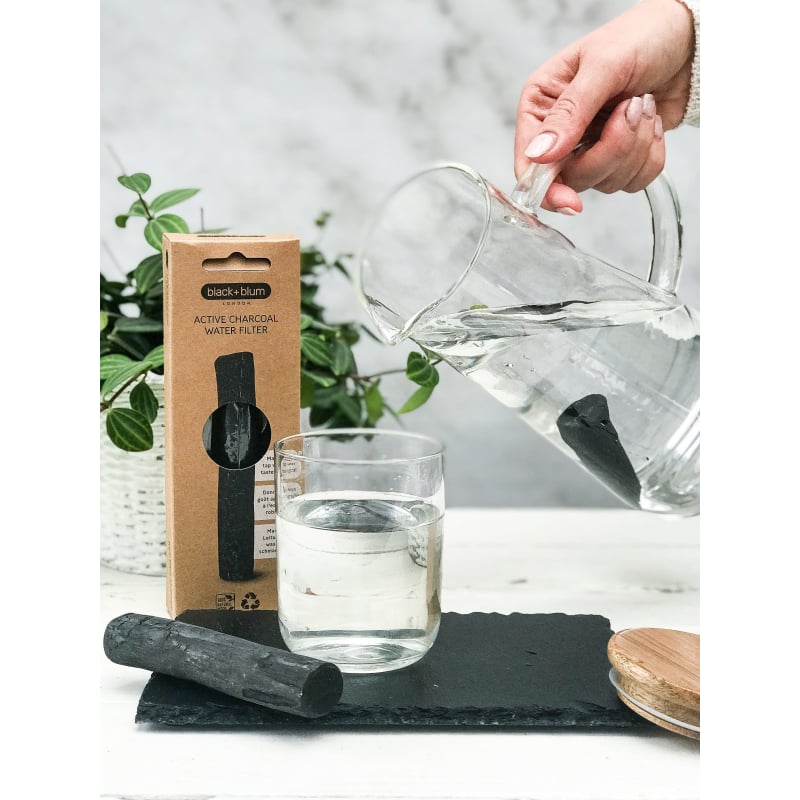
Nitrate
Plants require nitrate, which you undoubtedly learned in high school. Nitrogen is a necessary part of plant development that's not harmful to humans. However, when the amount is too high, it can lead to issues like Methemoglobinemia, attributed to poor oxygen. Nitrate levels can be reduced by 50-70 percent when you use activated carbon for water filtration.
Microplastics
Microplastics have become a big problem in every country. These are tiny plastic pieces that pollute freshwater sources. They're difficult to see with the naked eye since they're so small. Plastic has several negative effects on the human body. As a result, all microplastics wash away if you use an activated carbon filter.
Chloride
Chloride is a lifesaver in managing blood pressure, blood vacuum, and the pH balance of body liquids. It has no harmful health effects, although it gives water a salty flavor when used in excessive quantities. They use chlorine to eradicate dangerous viruses and bacteria during the chlorination process. Activated carbon filters, on the other hand, are essential for filtering the salty aftertaste from water. It canstopsorine levels by up to 70%.
PFOS
Metal coating, firefighting foam, and stain repellants all include PFOS, a synthetic chemical. Over time, it has found a way to get into water supplies and the environment. PFOS may be harmful to mammalian species, according to research published in 2002. Therefore, you should use activated carbon for water filtering to properly remove PFOS from tap water, as it effectively destroys PFOS, PFOA, PFNA, and PFAS.
Herbicides
Herbicides, often known as weedkillers, are chemicals that control the growth of unwanted plants such as weeds. As you know, unwanted plants reduce the amount of water, space, and chemicals accessible to critical plants such as agricultural plants. It requires the removal of toxic plants. When using activated carbon for filtering, it eliminates the most frequent 12 herbicides involving Atrazine and 2,4-D.
FINAL THOUGHTS: Why Is Charcoal Good for Filtering Water?
Why is charcoal good for filtering water? For a good reason, charcoal water filters are one of the prominent types of water filters on the market. Activated charcoal provides a slew of economic, environmental, and health advantages. Today, give an activated carbon water filter a try in your home and see the difference.
